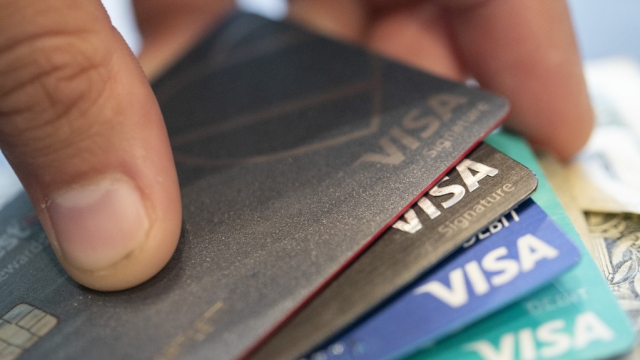Inflation is cooling, but during its peak in 2023, American consumers continued to spend, with many opting to pay with credit cards.
Recent data reveals that Americans are increasingly accruing higher levels of credit card debt, reaching a record-breaking peak.
“I think the U.S. consumer is walking towards a cliff, basically. They're running out of cash; they feel a bit excess things; they've been run down quite hard,” Chris Watling, CEO at Longview Economics, told CNBC News.
According to Paulina Likos of CNBC Business News, due to increased borrowing costs, some Americans are falling behind on their credit card payments as their household budgets are being squeezed.
The Federal Reserve Bank of New York's third quarter report says credit card balances in the U.S. hit a record high of $1.08 trillion.
For comparison, it reached about one trillion during the great recession in 2008, and 2023 has also seen a record high jump of $154 billion compared to the year before.
Credit card debt is still below student loan debt, but the damage is still far-reaching and growing.
Credit card APRs have gone up 30% over the last year and a half. That's the yearly interest rate consumers will pay if they carry some balance on the card.
Through December 2023, the APR for a new credit card was at nearly 23%, and households are increasingly becoming delinquent on their credit cards, meaning they are at least 90 days overdue on payments.
The rate of becoming delinquent on a credit card date reached its highest since the end of 2011.
“72% of Americans plan to increase their discretionary spending when they get a raise if you're saddled with credit card debt, if you're saddled with student loan debt, if you're having to, you know, pay more a month in bills, that could ultimately impact your lack of financial security too,” said Sarah Foster, a Bankrate analyst.
SEE MORE: New consumer goods report shows progress against inflation
The amount of debt owed on a credit card and your ability to pay it are two of the biggest factors impacting a person's credit score.
There can be many reasons that factor into the rising dependence on using credit to make payments.
Digitized spending and e-commerce make it easier to spend than ever. And in a tough economy, paying with credit can often be a lifeline for households that can't afford to pay for something immediately.
But it can be hard for many consumers to track how much money is actually being spent, especially as they navigate through fees for things like minimum payment requirements or changing APRs.
According to a survey by the financial management service Quicken, a little over a third of respondents said they expect to max out on at least one credit card by the end of the year.
Nearly 40% are living paycheck to paycheck and say they don't see a way to pay off the debt at all.
There are some services to help consumers climb out of the credit card debt hole, even those facing multiple delinquencies and maxed-out cards.
Non-profit debt management companies can help consumers navigate their options. One major one is consolidating multiple debts into a manageable monthly payment.
"My debt management payment right now is a single monthly payment of $1,031,” said Matt Solomon, who used a debt management service. "I don't have to worry about, you know, when is this credit card due? When is this due? And it just feels—it's such an accomplishment."
Other experts stress taking control of budgets before the credit gets out of hand, recommending consumers try to limit their spending with credit cards more carefully.
"Just writing it out, making sure that you can visually see your debt and truly show what that looks like as opposed to 'I think I owe this and I think I owe that' that actually adds more stress to everything,” said Rocio Smith, Market President for Achieva Credit Union in Hillsborough County.
Making the money you spend but can't see a realistic threat to financial freedom.
Trending stories at Scrippsnews.com




